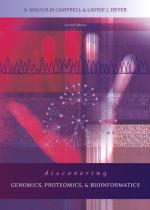|
This section contains 1,812 words (approx. 7 pages at 300 words per page) |

|
Proteomics is the science of studying the multitude of proteomes found in living organisms. A proteome is the entire collection of proteins expressed by a genome or in a tissue. The contents of a proteome can differ in various tissue types, and it can change as a result of aging, disease, drug treatment, or environmental effects.
This is contrary to the concept of a genome, which is an organism's complete collection of DNA. A genome's composition remains more or less constant from tissue to tissue, except for mutations and polymorphisms that can occur.
The word "proteome" was first coined in late 1994. By 1997 there were a number of research conferences focusing on proteomics.
According to the first draft of the human genome, based on the work by the Human Genome Project and by Celera Inc., there are only between thirty thousand and seventy thousand genes in the human genome...
|
This section contains 1,812 words (approx. 7 pages at 300 words per page) |

|


